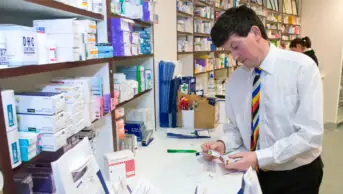
MARK THOMAS / SCIENCE PHOTO LIBRARY
Community Pharmacy Scotland (CPS) is calling for all pharmacy staff to be allowed to prepare and assemble medication without requiring supervision from a pharmacist or pharmacy technician.
Its comments came in its response to a Department of Health and Social Care consultation on pharmacy supervision, published on 7 December 2023, which sets out proposals to amend the Medicines Act 1968 and The Human Medicines Regulations 2012.
The consultation includes proposals to enable pharmacists to authorise pharmacy technicians to carry out, or supervise others carrying out, the preparation, assembly, dispensing, sale and supply of medicine; to enable pharmacists to authorise any member of the pharmacy team to hand out checked and bagged prescriptions in the absence of a pharmacist; and to allow pharmacy technicians to supervise the preparation, assembly and dispensing of medicines in hospital aseptic facilities
In its response, the CPS disagreed with the first of these proposals, arguing that “the preparation and assembly of [pharmacy] and [prescription-only] medications can be safely carried out from a registered pharmacy premises, without requiring supervision by a Responsible Pharmacist or an authorised pharmacy technician”.
CPS also said there is “a major flaw in the logic” of the government proposal because “it relies heavily on individuals rather than on safe systems”, making the proposed new way of working “vulnerable to changes in personal circumstance”.
“The environment, technology, training, conditions and [standard operating procedures] in the community pharmacy setting have a bigger effect on safety of preparation and assembly than supervision by an individual,” the response said.
CPS agreed that “the sale and supply should still require the supervision (but not necessarily presence) of a registered professional”, but argued that an impact assessment, published alongside the consultation, shows the benefits of the proposal are “very limited”, with less than 29% of pharmacists able to benefit owing to pharmacy technician workforce issues.
The impact assessment quotes data from the 2022 NHS England ‘Community pharmacy workforce survey‘, results of which showed that there were 5,252 pharmacy technicians (full-time equivalent) compared to 17,843 pharmacists in England.
CPS said: “100% of Scottish pharmacies are already delivering a range of clinical interventions, with around 20% offering independent prescribing services, which will rise to 100% by the early 2030s.
“Every pharmacist will need to be decoupled from the technical aspects of preparation and assembly to unlock the potential that advancing practice holds and deliver a sustainable NHS.”
The Association of Pharmacy Technicians UK (APTUK) has also published its consultation response, in which it agreed with all of the government’s proposals.
In its response to the first proposal, APTUK said: “Pharmacy technicians have the knowledge, skills and expertise to enhance patients’ access to pharmaceutical care.
“Through extensive pre-registration and post-registration training and experience, pharmacy technicians are perfectly placed to safely and effectively undertake the role described in this proposal.”
APTUK added that the proposal will be “a critical enabler in attracting people to the pharmacy professions, advancing professional practice and enhancement of the role of the wider pharmacy team”.
It also said that offering “enhanced roles such as that outlined in this proposal”, will increase training, recruitment and retention of pharmacy technicians.
The consultation closes on 29 February 2024.
2 comments
You must be logged in to post a comment.



You’re joking right. I absolutely donot agree with this concept. I’m sure the patient safety tzar would agree that this is a ridiculous idea
Does anyone agree with me ?
i agree. but what can we do right?